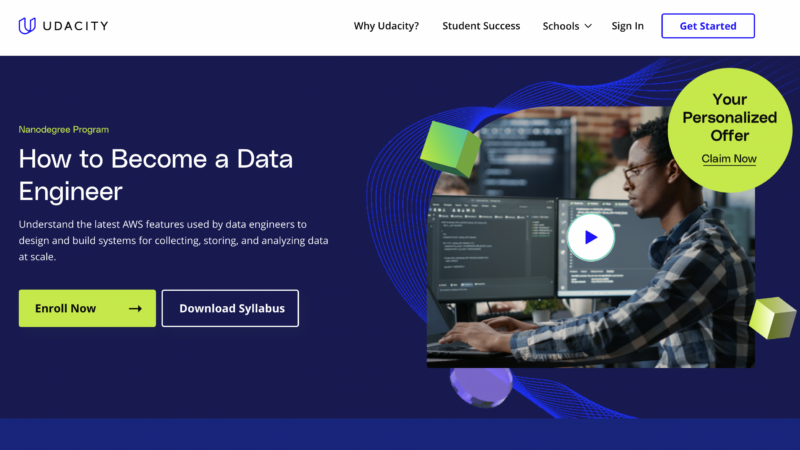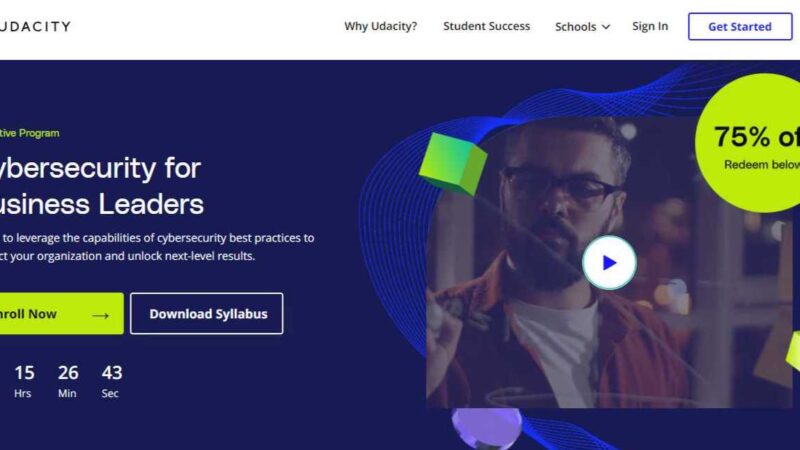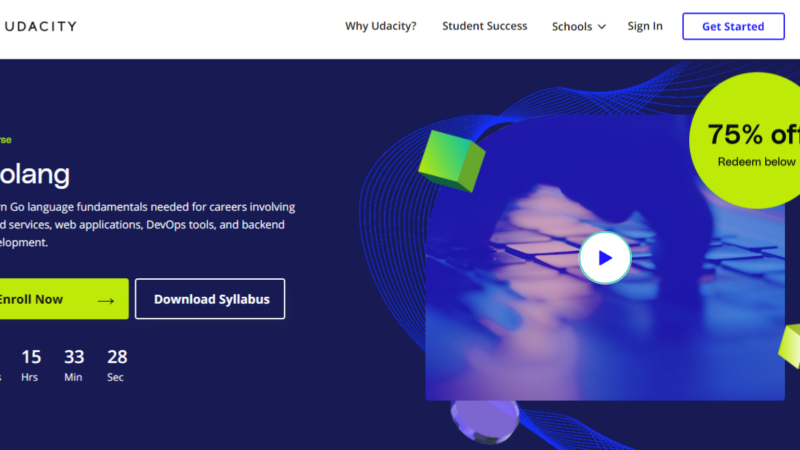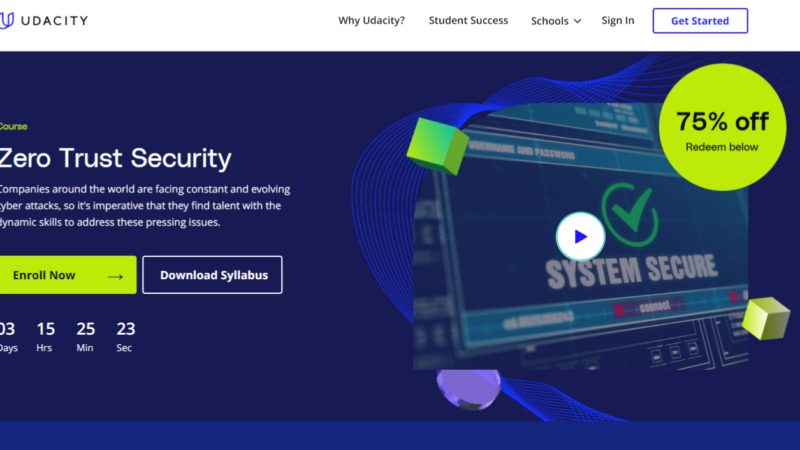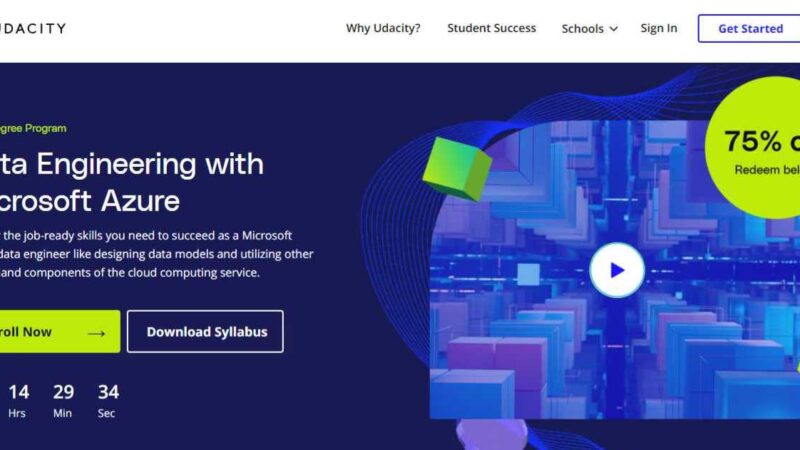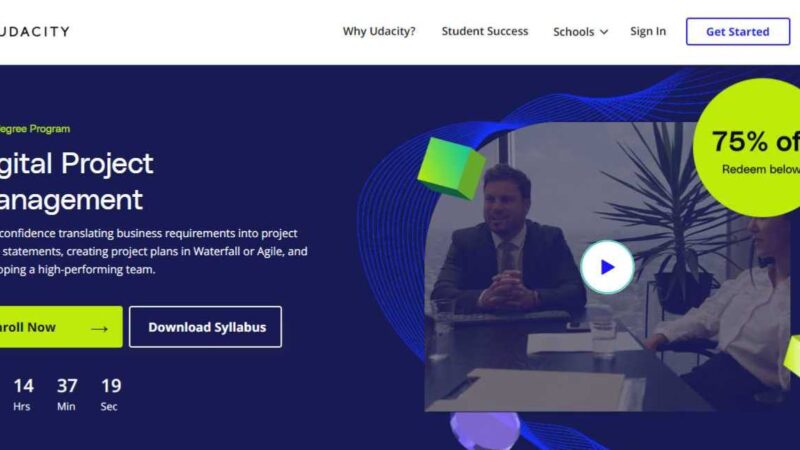Udacity Android Basics Nanodegree Review

Application development is alive and well and not going anywhere anytime soon. All companies are trying to make the digital transition, becoming more efficient in their practices thanks to the help of applications. As an Android application builder and developer, you could be in high demand, landing a career in no time. You might be thinking, where am I going to get the skills for that? Well, we’re here to let you in on a little secret! We’d like to introduce you to the Android Basics Nanodegree from Udacity. It takes all angles of development and wraps them into one course that takes, on average, about three months to complete.
That’s right, just three months to building a skill set that will have your developing apps in no time. As a matter of fact, at the end of this course, you will have built 6 apps, designing them and adding complex functions to them. If you haven’t heard of Udacity or a nanodegree, let us begin by leading you to make their acquaintance.
A Bit About Udacity
Udacity is an online academy that was created with the goal of bringing IT courses and lectures to learners all around the world. Two professors from Stanford teamed up in the creation, launching the site over ten years ago. What started as a small and humble idea, became a full-blown educational website with courses, lectures, and nanodegrees. Some of these nanodegrees were created in collaboration with top-tier companies, making Udacity a reputable online academy for those seeking IT skills.
A nanodegree is a short course that focuses on one topic. They are meant to go in-depth, taking learns through the course learning, and applying skills as they go. Like we said, some of these were created in collaboration with top companies in the business, including Google, Uber, and more. Apart from collab with industry leaders, each nanodegree comes with:
- A personal mentor to help with tech and more
- A community of learners
- Hands-on projects inspired by real industry issues
- Career preparation including mock interviews and resume help
- A-list instructors that have both teaching and industry experience
Meet your Instructors
Katherine Kuan
Katherine has worked with Google for several years as a developer and software engineer. During her time there, she worked with apps like Google Keep, Google Play, and the People app, optimizing them for Android devices. Her experience with one of the best companies in the business is her lead example through her lectures. She is fun and bubbly and full of useful information.
Jessica Lin
Jessica is an expert in Android. She knows all about the ecosystem of Android development, leading learners along the way as they learn the ropes of how everything fits together. She teaches a bit of everything, from the basics of Android development and beyond.
Jennie Kim Eldon
Jennie started her career with the US State Department where she was an advocate for programming for women and girls in Afghanistan. Soon after, she moved over to Udacity as a software engineer, later becoming one of many amazing instructors on the team and project lead for the Android and iOS Nanodegree programs.
Asser Samak
Asser is an app builder that has worked with both Udacity and Google for 4 years and counting. He has a genius mind and a passion for leading learners. His theory is based on building a strong foundation, using that to solidify learner’s skills and help them build new ones.
Lyla Fujiwara
Lyla has led all levels of learners through the building of Android apps. From high school students to senior developers, she has taught them all and is ready and anxious to teach you too! As of now, apart from teaching with Udacity, she is working on the Google News app for Android.
Joe Lewis
Joe is the author of many books on web development. He has years of experience in developing and working with Google Analytics. Besides his life as a developer, he is super active and enjoys mountain biking among other hobbies. During his lectures, you’ll see he is just a normal guy with a passion to pass on his knowledge to those willing to listen.
Course Breakdown
Prerequisites
For this course, the main thing that you will need is motivation. Apart from that, a set of very basic computer skills that include opening files and surfing the web. As far as software, you need to be sure and have a computer with the capability to run Android Studio. This is what you will use when constructing apps so it is a vital part of the course.
Into to User Interface
App development starts with an idea. From this idea, developers take to XML to create layouts that create layouts that will serve as a solid infrastructure for the application. At the end of this section, you’ll build a simple application, one that displays information about a company.
User Input
This is where you will learn a bit about object-oriented programming. Using the help of JavaScript, you’ll use interactive code, to create a coffer-ordering app. You’ll get a walkthrough and then, you’re set free to create your own. There are two skill-building projects at the end of this section. The first is a scorekeeping app, one that you design to keep score while two players compete. The second app is a quiz app, which you will build using your newly learned skills.
Multi-Screen Apps
This is where you’ll start to take your developing skills up a notch. You’ll layer screens to add images and audio to apps to make them come alive. On top of that, you’ll put some design skills to the test, creating a visually pleasing and functional app. Take your app-building to the next level in this section by creating two apps, one musical structure and the other a tour guide. Use your imagination to create designs and build the apps from the ground up.
Networking
Web APIs are the foundations of apps, and you’ll learn how to use them. Learn the basics of networking in Android and HTTP, using them to expand your application building horizons. At the end of this section, you’ll create a Newsfeed app that provides regularly updated news. You get to choose the topic and the presentation, creating your very own app with your own unique hints of style.
How Long Does the Course Take?
When all is said and done, you will have created 6 total applications. Sounds like a lifetime but, thanks to open-source code, application development is faster than ever. These keep up with development cycles and will have your working as a real developer in the fast-pasted world of deployment cycles. Udacity estimates that it will take 3 months to complete the course if learners are dedicating 10 hours a week. While you can take advantage of Udacity’s self-paced perk, taking all the time you want as long as you keep on track with deadlines, you might want to consider the course cost before taking your sweet time.
What’s the Course Cost?
The course cost depends on the total amount of time you take to complete the course. This is why you might want to reconsider taking your time, creating a schedule that you can follow beforehand. While 3 months is a good estimate, it is only 10 hours a week. If you can dedicate more, you might want to shoot for 2 months, saving a few bucks in the process. Udacity offers two ways to pay, including:
Pay Per Month
This is the option where you can take as much time as you want. The only thing you have to be on the lookout for is the deadline for projects. Each of the applications is looked over by instructors, receiving feedback that you won’t want to miss. With this way to pay, Udacity charges per month of access, which comes to $359. As you can probably guess, this can add up if you take your time, jumping into the quadruple digits fast.
Udacity’s Bundle Deal
Taking Udacity’s recommendation as far as course duration, you can enjoy a 15% discount. This is part of Udacity’s bundle deal, which puts the three months of access together and slaps one easy to pay price. In this way, the total course cost comes out to $927. Not too shabby if you agree with the estimate plus, you’ll save a few bucks in the end.
What Learner’s Say
This course has an overall rating of 4.8 out of 5 stars, as given by more than 1700 previous learners. Here is what a few of them had to say:
“This educational program was absolutely amazing! I received so much knowledge in a very simple and understandable way! when i am saying absolutely amazing i am not exaggerating at all. Let me explain you why ! i Graduated from a Greek public highest level educational institution (same as a university) where the ‘teachers'(idont even call them professors ) taught me literally nothing.” – Stavros F.
“In perspective of last few months, I noticed an incredibly important change in my mind – I believed in my skills. I saw my GitHub repository and said “Woow! Is all that my work?!”. Even if I need to practice more with learned concepts to better understand it, I know I can look for help in my previous projects. One of the most important things to me was learning how to read the android/java documentation – before the course, it was a magic for me, now it’s much easier and more understandable. The course is designed in that way I was feeling all the time I’m getting better and better.” – Grzegorz W.
How’s the Job Market?
Application development is all the craze these days. There is a huge demand as application cycles become more rapid. Those with the skills needed to develop complex apps have a lot of opportunities, whether it is working for a company that specialized in Android apps or, taking the freelance route as a developer. A recent report from adtmag.com showed that specific Android development skills are in demand but have also declined on the job seeker front. What this means is that, when entering the field in search of a job, you may be put at the top of the pile as companies push to reach grueling deadlines.
Salaries are also attractive, where the average developer pulled in around $107,000 per year as per an analysis by businessofapps.com. Add all of these positives together and tack on the Udacity name and you’re sure to have a gig in no time. You’re learning from an expert in Android app building and can get your foot in the door easier as a Udacity nanodegree graduate.
Final Thoughts
The world of application development is exciting. It’s caught the attention of several companies as they attempt to make the switch to a more digital way of doing things. To start building up the skills needed to jump into the field, you could start with the Android Basics Nanodegree from Udacity. It’s got all the things you’ll need to build a solid foundation taught by instructors, most of which have worked with Android and Google during their careers.
With help from career services, it isn’t so hard to land your first job, especially with the title in demand and rising year after year. The only thing to think about is the amount of time you think it will take you to complete the course, choosing the option to pay that best suits you and your budget. Breaking into Android application development is easy, especially after scooping up the basic skills. As a Udacity graduate, you can start building your knowledge base, creating some of tomorrow’s most-used apps as you advance in your career.
